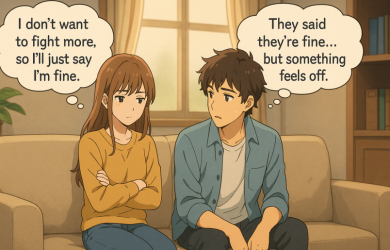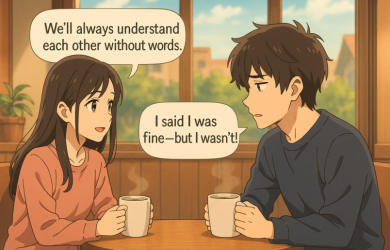What Is Cognitive Bias: Everything You Need to Know

Heal & Grow Daily for a Happier Relationship
Subscribe FREEKey Takeaways
Marriage.com AI Quick Summary
Do you feel safer on a plane or in a car?
Do you fear sharks or mosquitos?
Statistically, planes and sharks are disproportionately safer, but with our availability bias, we tend to believe otherwise. You can’t avoid cognitive biases but you can learn to manage them for better relationships.
Mosquitoes have killed more people in a day than sharks in 100 years, and statistics show that planes are far safer than cars.
What other fears and irrational conclusions do you make every day?
The more you know about your biases, the more you can wisely manage them.
Cognitive biases explained
Everything we experience in life is an interpretation based on our past experiences. From the moment we are born, we learn to apply judgment and concepts to function in the world.
As this article on “reality is constructed by your brain” demonstrates, our brains constantly adjust to sensory information. We don’t have the right machinery to interpret all the information accurately, so we take shortcuts, often subconsciously.
In the same way, we can fall victim to optical illusions. We are subjected to cognitive biases in everyday life. If you have a human brain, there’s no getting away from them.
So, what is cognitive bias? According to the Encyclopaedia of Behavioral Neuroscience, cognitive bias definition states that such biases are when “human thinking and reasoning does not comply with the tenets of logic, probability reasoning, and plausibility.”
In other words, cognitive biases are errors in thinking when processing information that leads us to wrong conclusions. This type of thinking is usually unconscious. Moreover, psychologist Daniel Kahneman famously called this our system one thinking in his book Thinking, Fast and Slow.
There are hundreds of different types of biases in psychology, but it’s worth noting implicit bias, which differs slightly. Where cognitive bias in psychology refers to our automatic, fast thinking processes, implicit bias relates to stereotypes and our beliefs about, for example, gender, race, and sexuality.
All these implicit and cognitive biases come from our brains being designed to spot patterns and quickly draw conclusions. It’s very useful at times but it can also be detrimental to relationships.
The good news is that you can learn to observe your biases, so they no longer control you.
Five traits of cognitive bias in action
Another way to look at the “what is cognitive bias” question is to consider how many assumptions you make every day. While there are hundreds of different types of cognitive bias, the following signs are typical of most.
1. Judging too quickly
Psychological biases are rooted in jumping to conclusions. For instance, if your date is a lawyer, do you automatically assume they make a lot of money?
What about when you see them checking their watch as soon as you arrive at the “in-laws,” and you assume they will leave you in the lurch?
All this leads to misunderstanding and conflict.
2. Blaming external factors
What are cognitive biases? They are the brain’s way of explaining things when you don’t have all the information. We make assumptions about people rather than looking for external factors that might have driven their behaviors.
For example, it’s easy to think your partner is lazy or incompetent because they couldn’t pick up the kids. It’s just what the mind does.
Instead, force yourself to consider factors outside their control that might have impacted their ability to complete their task.
3. Tunnel vision
The cognitive bias examples in the next section will show how biases spur us to ignore other viewpoints. We fixate on whatever information we’ve chosen and assume it’s true without questioning it.
Remember that if you’re telling yourself that you never have tunnel vision, you’re experiencing a cognitive bias. Again, you can’t escape this if you have a human brain.
4. Emotional reactions
Another way to explore the question “what are cognitive biases” is to consider emotions. Not only can you experience emotional biases such as loss aversion, but cognitive bias usually leads to some emotional response.
That’s why it’s hard to let go of our biases. We often become emotionally attached to our conclusions and decisions and don’t like to challenge ourselves to consider other viewpoints.
This takes effort and an assumption that we could be wrong. After all, we are biased to believe that we’re right.
5. No facts
Psychological biases blind us and make us slaves to our brains. As we don’t naturally look for data or different viewpoints, we, in effect, limit ourselves.
Instead, you can practice developing your critical thinking skills. You need to work through a structured problem analysis approach, as explained in this leadership article on learning to think critically.
The same principles apply to relationships, as we’ll see shortly.
Ten most common cognitive biases
These are just some of the many types of cognitive bias, but they give you a good summary of the main biases we all experience.
1. Confirmation bias
Common cognitive biases always include confirmation bias in relationships because it’s normal for all of us. It’s when we only look for information to support our decisions or conclusions about something.
And what is confirmation bias in psychology? It’s when clinical researchers need to fully test their hypotheses with varied enough data.
2. Self-serving bias
A cognitive biases list should always include this when referring to relationships because it can be damaging.
People who use this subconsciously boost their self-esteem by assuming that everything good happens to them is because of their innate personality traits. Conversely, anything bad is because of external factors.
This often translates into not taking responsibility for our mistakes which can slowly erode trust and compassion within a relationship.
3. Optimism bias
Another cognitive bias in psychology is when people overestimate the good around them.
While a reasonable amount of optimism is good, not planning for potential risks in life can expose you and your partner to unnecessary suffering.
4. Attentional bias
As this overview of where we focus describes, external factors can sway our attention. For example, if you’ve just started dating, you might suddenly notice that all the other attractive people are no longer available to you.
This bias can lead to overthinking and anxiety as you crave things you can’t have or control.
5. Negativity bias
Most people know about negative cognitive bias, but are you aware of how it impacts you personally? So, a single negative thought can reshuffle your day from a joyful to a sad and irritable experience.
This one is particularly prevalent in relationships. If you fixate on why your partner doesn’t message you at a particular time, you could conclude that they don’t care. This only leads to a vicious circle of confusion and anger.
Watch this video about how negative emotions impact your body which only aggravates the situation:
6. Planning fallacy
How often do you leave holiday packing until the last minute to realize you don’t have time to buy that swimsuit before leaving?
Or that the kids always seem to be in bed so late because they can’t finish dinner in time?
We often underestimate how long it takes us to complete various tasks, which creates a domino effect throughout the day, further impacting our well-being.
7. Overconfidence effect
Sometimes referred to as the Dunning-Kruger effect, this bias is when we have excessive faith in our ability to make the right decision. It often also blinds us so we can’t even see, let alone appreciate, the skills our partner has to offer.
8. Halo effect
Another from the list of common cognitive biases is when we use one attribute about someone to judge the whole person. For instance, you assume someone is kind because they look physically good.
9. False consensus bias
Many of us fall victim to this bias, where we believe that our attitudes and approaches to life are common. So, we assume everyone thinks like us and has the same opinions.
Even close siblings with the same upbringing have different views on life.
10. Present bias
Another important one for any cognitive biases list is our tendency to value rewards in the present over receiving something in the future. For instance, our brain prefers that chocolate cake now rather than aiming for the perfect weight in the future.
This one also impacts financial planning, where you might rush into buying a home now without planning for your future needs.
The impact of cognitive biases
As you can imagine from the list above, cognitive biases impact our decisions and those around us. They can lead to misunderstandings, resentment, full-blown arguments, and prejudice.
Sometimes they make us miss opportunities because we need to focus more on our normal way of doing things. Moreover, biases limit your problem-solving capabilities and even your growth potential.
Then again, we have these biases to make life simpler for us. In some cases, they can be positive, as this paper on maintaining life satisfaction suggests.
Nevertheless, unless you’re a saint with no earthly concerns, it’s best to assume that cognitive biases are negative for all of us.
Five illustrations of cognitive biases in everyday life
Before managing your biases, it’s good to get familiar with some real-life cognitive bias examples.
- Optimism bias can lead you to statements such as “things always work out, so we don’t need to save.” As you can imagine, this can have disastrous effects in the future.
- With confirmation bias in relationships, you might convince yourself that all the clues you see mean that your partner is cheating on you.
So, what is confirmation bias? It’s when you favor information that validates your current beliefs and theories.
Most importantly, what is a confirmation bias example for you? In what instances do you only refer to facts that enhance your arguments? How can you start looking for different sources of information?
- When a negativity bias influences you, you assume nothing will go right. So, you conclude your partner can’t be trusted or that their faults define them.
Another way you might experience negative cognitive bias is when you believe that only bad things happen to you. In that case, you might start worrying that your partner is about to break up with you because they’re suddenly doing late nights in the office.
- False consensus bias might lead you to believe your partner has the same political beliefs only to be sorely disappointed later down the line. Another common example is when it comes to raising kids.
- Have you been duped by the halo effect, where you believe someone is inherently good because they’re attractive? When you discover the dissonance later, it can be a huge shock.
Navigate cognitive biases wisely with couples therapy exercises
Our automatic mental processes are always active. We can’t turn them off, and nor should we want to because they can save our lives. For instance, we don’t want to pause, analyze and reflect when we need to jump back from a racing car before crossing the road.
The alternative approach is to nurture our critical and mindful thinking skills. We do this by practicing curiosity, learning to pause, and challenging our assumptions.
As you can imagine, this is challenging because it means thoroughly analyzing ourselves and being brutally honest about our flawed thinking. This gives the ego a bit of bashing that it really doesn’t like.
That’s why many people turn to counsel before marriage to raise self-awareness and develop objectivity along with compassion. In the meantime, the following exercises give you a starting point to do with your partner.
1. Neutralize judgemental thoughts
This practical worksheet gives you a step-by-step process to observe and let go of your judgments.
Work through it with your partner and listen to their views after you’ve completed your forms. You’ll then open up a whole new range of viewpoints.
2. Get to know your decision-making process
Cognitive bias in decision-making is detrimental because we don’t consider all possible options. So, next time you need to decide on one side of a piece of paper, make a list of your assumptions and beliefs about the situation.
Then, write down opposing assumptions and beliefs on the other side of the paper. How do these then impact your view of the situation and possible decisions to take?
3. Who and what are your trusted information sources?
We are influenced and biased by our past experiences but also by those around us. Affinity bias, where we gravitate towards people like us, makes us see the world in one way. A powerful way to challenge this is to talk to people with different backgrounds and opinions.
In this exercise, make a list of all your trusted friends and news sources. Next to each one, write down their top 3 characteristics. For example, where they work, their political views, and their schooling background.
Once you’ve finished your lists, review what is influencing you. How can you bring alternative views into your life?
FAQs
1. Is loving someone influenced by cognitive bias?
Let’s remind ourselves of the question “what is a cognitive bias” with the answer that it’s flawed thinking to shortcut information.
It makes our life easier whilst also creating a lot of misunderstanding and pain. The opposite of all this is to adopt logical and objective thinking.
It gets complicated when we talk about love. Our decisions are inherently tied to our influences and who we love is subconsciously biased. As we’ve mentioned, you may be experiencing a halo effect or affinity bias when meeting someone for the first time.
Nevertheless, our brains also take over in the love process and release addictive hormones into our system, as described in this science article on how love changes your brain. So we can’t just blame cognitive biases for loving someone.
2. Is falling in love a decision or something that happens to us?
Whether we have freedom of choice is a hugely complex question for which multitudes of philosophy and psychology books have been written. Debates have existed for centuries as to what choice actually is.
The “cognitive biases” meaning tells us that our brains have a life of their own, in a sense. They are programmed to interpret current situations based on past experiences. This creates flawed thinking and is potentially out of our control and therefore our choice.
Despite biases, various psychologists have given us various theories to explain choice, including William Glasser’s choice theory. Nevertheless, neuroscience today shows us that the brain knows our movements before we do them, as this article on whether we really have a choice describes.
We also know that our brains are flooded with happy chemicals when we fall in love.
It appears that the theories point to us not having a choice when we fall in love. Then again, at some stage, psychologists tell us that we have a choice in how we respond to situations.
It could be one of the greatest ethical questions of all time. How much choice and responsibility do we truly have over our emotions, beliefs, and actions? And do we want that responsibility?
The takeaway
How will you live with your cognitive biases?
In summary, what is cognitive bias? It’s a mental filter we use to conclude the world that leads us to misinterpret reality.
There are many cognitive bias examples in real life. These range from over-believing in luck to focusing too heavily on information that supports our beliefs. We can never escape such biases, but we can train ourselves to observe and better manage them.
To move from automatic to objective thinking, we must practice being mindful and curious about other viewpoints. We can also challenge our assumptions when we make decisions and surround ourselves with people who think differently.
Such personal work is highly rewarding, but it takes patience. Moreover, we usually need a guide to help us see our blind spots, so don’t hesitate to go to counseling before marriage. Don’t take this journey alone because, as T. S. Eliot once said, “humankind cannot bear very much reality.”
 Tips
Tips
Write your tip or submit a video tip
All tips are reviewed before the publishing.
Share this article on
Related Articles
Recent Articles
Related Quizzes
Heal & Grow Daily for a Happier, Healthier Relationship
Subscribe FREE on YouTube We'd love your feedback!
We'd love your feedback!
 Expert Q&A
Expert Q&A
Ask your question related to this topic & get the support you deserve from experts.


 Reviewed by
Reviewed by
















 Thanks for your feedback!
Thanks for your feedback!